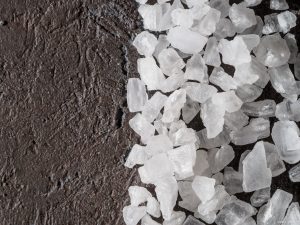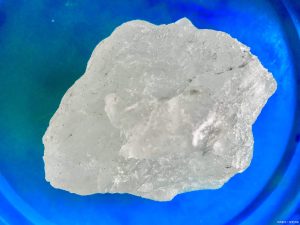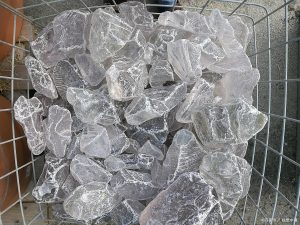What is barium sulfate?28
Barium sulfate, chemically formulated as BaSO₄(CAS: 7727-43-7), is an odorless, white, orthorhombic solid that is insoluble in acids and alkalis but completely soluble in a molten state. As a common inorganic salt, it has a wide range of applications in fields such as ceramics, glass, coatings, pharmaceuticals, and catalysts.

Next, let’s explore the role and application of BaSO₄ in nylon modification.
§ The Role of BaSO₄ in Nylon Modification
BaSO₄, as an important inorganic mineral filler, plays multiple roles in the modification of nylon (particularly PA6 and PA66), extending far beyond simply reducing costs.
- Balancing Toughness and Rigidity
Improving Rigidity (Stiffness, Flexural Modulus): BaSO₄ is a rigid particle. When added to the nylon matrix, it effectively restricts the movement of polymer chains, thereby increasing the stiffness, hardness, and flexural modulus of the composite material.
Maintaining or Improving Toughness: This is the core advantage of barium sulfate over many other inorganic fillers, such as calcium carbonate and talc. Surface-treated ultrafine barium sulfate (nano- or submicron-sized) acts as a stress concentration point, inducing crazing and shear bands in the nylon matrix upon impact, absorbing significant impact energy. This improves rigidity without significantly reducing or even improving the material’s impact toughness, especially at low temperatures.
- Improved Dimensional Stability
Nylon is highly hygroscopic and experiences significant dimensional changes upon absorbing water. BaSO₄ has extremely low hygroscopicity and a much lower thermal expansion coefficient than nylon.
The addition of barium sulfate significantly reduces shrinkage and warpage caused by moisture absorption or temperature fluctuations in nylon products, improving dimensional accuracy and long-term stability. This is crucial for the manufacture of precision structural components such as gears, bearings, and connectors.
- Increased Density and Specific Gravity
The density of barium sulfate (approximately 4.5 g/cm³) is much higher than that of nylon (approximately 1.14 g/cm³). By adding barium sulfate, the density of nylon composites can be easily adjusted, giving them a “heavy” or “premium” feel. This is advantageous in applications requiring a certain weight, such as high-end audio weights, simulation models, and tool handles.
- Improved Processability
Barium sulfate has a low coefficient of friction and high thermal stability. It acts as a lubricant during processing, improving melt flow and reducing wear on the screw and mold.
It can also reduce molding cycle times because its thermal conductivity helps the material cool and set faster.
- Chemical Resistance and Insulation
Barium sulfate is chemically very stable and resistant to acids, alkalis, and chemicals, maintaining the inherently good chemical resistance of nylon.
It is also an excellent insulator and does not affect the electrical insulation properties of nylon.
- Impact on Optical Properties
Barium sulfate has high whiteness and excellent light reflectivity. When producing nylon products with high whiteness or reflectivity, it is an ideal white filler. Furthermore, because its refractive index is close to that of nylon, adding it in appropriate amounts has a relatively minimal impact on the material’s transparency (compared to other fillers).
- Cost Reduction
As a filler, replacing some of the more expensive nylon resins is one of the most direct and effective methods for reducing material costs.

§ Application Methods of Barium Sulfate in Nylon Modification
To successfully apply barium sulfate to nylon modification and achieve ideal properties, the following key aspects require attention:
- Barium Sulfate Selection
Particle Size and Distribution: This is the most critical factor. To achieve both toughening and strengthening, ultrafine barium sulfate (average particle size between 0.1μm and 1μm) or nano-barium sulfate is typically selected. The smaller the particle size, the narrower the distribution, the more uniform the dispersion in the matrix, and the better the modification effect, especially the improvement in toughness.
Surface Treatment: Untreated barium sulfate has poor compatibility with nylon and easily aggregates, resulting in weak interfacial bonding, stress defects, and brittleness. Therefore, surface-treated barium sulfate must be used.
→ Commonly used treatment agents: Silane coupling agents (such as aminosilanes and epoxysilanes) are the most commonly used. They form strong chemical bonds between the barium sulfate surface and the amide groups of nylon, significantly improving interfacial bonding.
→Other treatment agents: Stearic acid, titanate coupling agents, etc. are occasionally used.
Purity: High-purity precipitated barium sulfate is preferred. It contains low impurities (especially metal ions such as iron) and does not affect the thermal stability and color of nylon.
- Formulation Design
Additional Ratio: The addition level of barium sulfate is typically between 10% and 40% by weight.
→Low addition level (10%-20%): Primarily used to improve dimensional stability and processability, with minimal impact on mechanical properties.
→Medium addition level (20%-30%): This is the most common range, achieving a good balance between cost, stiffness, toughness, and dimensional stability.
→High addition level (>30%): Primarily used in high-density formulations, which require exceptional surface treatment and dispersion technology; otherwise, mechanical properties (especially impact strength) will be significantly reduced.
Synergistic formulations: Barium sulfate is often used in combination with other modifiers.
→ Use with glass fiber (GF): GF provides extremely high strength and rigidity, while barium sulfate improves warpage, surface finish, and impact strength.
→ Use with toughening agents (such as POE-g-MAH and EPDM-g-MAH): In applications requiring extremely high toughness, barium sulfate and elastomer toughening agents can be used together to achieve both strength and toughness.
- Processing
Mixing: Premix the dry nylon resin, surface-treated barium sulfate, and other additives (antioxidants, lubricants, etc.) thoroughly in a high-speed mixer (such as a blender).
Extrusion Granulation: Melt blending, extrusion, cooling, and pelletizing are performed using a twin-screw extruder. This is the core step.
Key Process Points:
→ Vacuum Exhaust: Vacuum exhaust must be enabled to remove moisture and low-molecular-weight volatiles generated during mixing and prevent bubbles in the finished product.
→ Screw Assembly: A suitable screw assembly must be designed to ensure sufficient shear force to break up barium sulfate aggregates and achieve nano/micron-scale dispersion, while also avoiding excessive shear that could cause nylon degradation.
→ Processing Temperature: Observe the normal processing temperature range for nylon (e.g., approximately 230-260°C for PA6).
Injection Molding: Modified nylon/barium sulfate composite pellets must be thoroughly dried before injection molding (typically in a forced-air oven at 80-100°C for 4-6 hours) to prevent hydrolysis and degradation due to moisture.

§ Summary and Application Examples
Summary:
Barium sulfate is an excellent functional filler for nylon modification. It offers a balance of stiffness and toughness, excellent dimensional stability, and processability, making it widely used in various fields. The key to its successful application lies in selecting ultrafine, surface-treated products, and ensuring good dispersion and interfacial bonding within the nylon matrix through a rational formulation and optimized processing.
Application Examples:
✔ Automotive Parts: Engine hoods, door handles, throttle bodies, sensor housings (requiring dimensional stability, heat resistance, and low warpage).
✔ Electronics and Electrical: Precision gears, bearings, coil bobbins, connectors (requiring high precision, low creep, and insulation).
✔ Tools and Consumer Goods: Electric drill housings, high-end scissor handles, audio components (requiring a substantial feel, wear resistance, and a good appearance).
✔ Sporting Goods: Snowboard bindings, bicycle parts, etc.
§ Applications and Uses of BaSO₄ in Other Industries
- Ceramics and Glass Industry: BaSO₄ is primarily used in the ceramics and glass industries to improve product performance and adjust costs. In ceramics, it can improve molding fluidity, promote sintering, and improve mechanical properties. In glass, it can lower melting temperatures, enhance clarification, and reduce bubble formation.
- Coatings Industry: BaSO₄ is primarily used as a filler and thickener in coatings, improving hiding power, increasing viscosity, and imparting special properties.
- Pharmaceutical Industry: BaSO₄ is widely used in the pharmaceutical industry, primarily as an X-ray contrast agent and drug carrier. It can assist doctors in the diagnosis and treatment of gastrointestinal diseases and can also be used in the preparation of medicated dressings to promote wound healing.
- Catalyst: BaSO₄ can act as a catalyst in certain chemical reactions. For example, in some organic reactions, it can increase reaction rates and selectively promote reactions.
- Other Uses: In addition to the aforementioned applications, BaSO₄ can also be used in the manufacture of rubber, plastics, cosmetics, and other products.
#Barium Sulfate#Nylon#PA6#PA66#Catalyst#Ceramics#Glass#Coatings#Medicine#Rubber#Cosmetics#Auto Parts#Electronics#Sporting Goods#Acid Resistant#Alkali Resistant#Chemical Resistant




